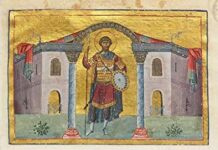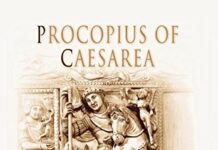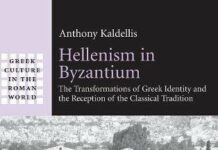
Ebook Info
- Published: 2019
- Number of pages: 384 pages
- Format: PDF
- File Size: 23.56 MB
- Authors: Anthony Kaldellis
Description
Saints of Ninth- and Tenth-Century Greece collects funeral orations, encomia, and narrative hagiography. Together, these works illuminate one of the most obscure periods of Greek history―when holy men played central roles as the Byzantine administration reimposed control on southern and central Greece in the wake of Avar, Slavic, and Arab attacks and the collapse of the late Roman Empire. The bishops of the region provided much-needed leadership and institutional stability, while ascetics established hermitages and faced invaders. The Lives gathered here include accounts of Peter of Argos, which offers insight into episcopal authority in medieval Greece, and Theodore of Kythera, an important source for the history of piracy in the Aegean Sea.This volume, which illustrates the literary variety of saints’ Lives, presents Byzantine Greek texts written by locals in the provinces and translated here into English for the first time.
User’s Reviews
Editorial Reviews: Review “This volume offers an essential selection of texts. Kaldellis and Polemis need to be commended not only for their enterprise to put them together and provide information on their importance and topics that emerge through these compositions and the intertextual sources that seem to be present in these works, but also for their translation from Medieval Greek given their various styles.”―Michail Kitsos, Medieval Review About the Author Anthony Kaldellis is Professor and Chair of the Department of Classics at The Ohio State University. He is the author of many books, including The Christian Parthenon, Hellenism in Byzantium, and The Byzantine Republic, which have been translated into French, Greek, and Russian.Ioannis Polemis is Professor of Byzantine Philology at the National and Kapodistrian University of Athens.
Reviews from Amazon users which were colected at the time this book was published on the website:
⭐This book translates for the first time very important research and information regarding Byzantine saints from the middle-byzantine era. It includes St. Nicholas the Younger, St. Athanasios of Methanone, St. Peter of Argos, St. Theokletos of Lakedaimon, St. Arsenios of Kerkyra and with special interest the wonderful Theodore of Kythera and Monemvasia. Each chapter describes either the life of the saint as transcribed from known sources, bibliographies and papyri. On martyrdom of Nicholas the younger, the book comprises of two translated sources; one is an account of Nicholas’ journey and second, an Encomium by Presbyter Achaikos. Both are very informative, and interesting to read. On Athanasios, a Funeral Oration by the Bishop of Argos, Peter describes the saint’s life as “everyone is given a certain gift by God and not so much for his own sake but for him to share with his brethren.” “For each of us is required to be benefit to his fellow man, and we will not be able to claim ignorance because we have it at our own will and at our own disposal knowledge of Truth and that what is righteous and just. In the Life of Peter the Bishop of Argos, Theodore of Nicaea, explains how his body “emitted a performed oil which could only be seen and smelled to those who came near the corpse of the saint . A perfume which cast out the demons and cured every illness of those near it.” The miracles of Theokletos, Bishop of Lakedaimon, is described in a parable between judging “the tree which beareth the fruit or the spring which flows water,” and that the Bishop was a great protector for those whom easily became ensnared with life’s vices. He was a “great captain on the ship for his followers.” He made it his mission to protect those whom were treated unjustly. As those who prosecuted others his parable of “the mask worn by them showed a being of piety but the soul within concealed the sight of its true character.” The most important philosophy which came from Theokletos and one which needs further contemplation upon one’s own life and mercy granted is that you can not neglect nor delude yourself because of “laziness” & “indifference” you fail to withhold the truth and wisdom of those that fallen into villainy and clefts of falsehood. You too can not escape the punishment they will receive by the infallible judge. He will demand an accounting for the blood which you have been stained because you allowed them to become weakened in spirit and in wisdom. Therefore, do not overlook those who behave inviolate as you will “heap coals on your own head.” {This is an important principle even in today’s modern complexity. When we are silent, we condone those we know act in falsehood therefore committing the act of perdition ourselves.} The Archbishop of Kerkyra is commemorated for his piety and lived during the time of Basil II. Lastly, the story of Theodore of Kythera as told by “Leo”, is of a late 8th & early 9th century saint. It is a marvelous story and is one that needs to be told further due to the importance of his life and the Byzantine places which he found himself thereby placing him in the hands of Fate and her destiny which she had in store for him. Its a wonderful new book by Dumbarton Oaks.
⭐received thank you
Keywords
Free Download Saints of Ninth- and Tenth-Century Greece (Dumbarton Oaks Medieval Library) in PDF format
Saints of Ninth- and Tenth-Century Greece (Dumbarton Oaks Medieval Library) PDF Free Download
Download Saints of Ninth- and Tenth-Century Greece (Dumbarton Oaks Medieval Library) 2019 PDF Free
Saints of Ninth- and Tenth-Century Greece (Dumbarton Oaks Medieval Library) 2019 PDF Free Download
Download Saints of Ninth- and Tenth-Century Greece (Dumbarton Oaks Medieval Library) PDF
Free Download Ebook Saints of Ninth- and Tenth-Century Greece (Dumbarton Oaks Medieval Library)





